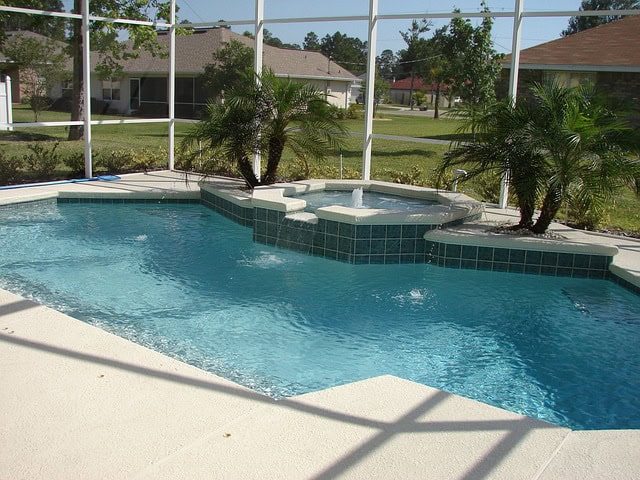
Is your pool area looking a little lackluster? Or are you planning to build a brand new pool and want to ensure it becomes the centerpiece of your backyard paradise? Look no further, as we dive into the world of pool decking, exploring the best options available and the key factors to consider when choosing the perfect deck material for your oasis. Let’s embark on a journey through the intricacies of “what is pool decking” and find out which option is the best fit for you.
Pool Decking Explained
- Understanding pool decking involves considering soil composition, backyard features and local climate.
- Different materials are available for creating a pool deck including concrete, wood, composite pavers and brick. Each have their own advantages & disadvantages.
- When choosing a material, it is important to consider factors such as cost, safety & maintenance before installation in order to ensure the longevity of your outdoor oasis.
Understanding Pool Decking
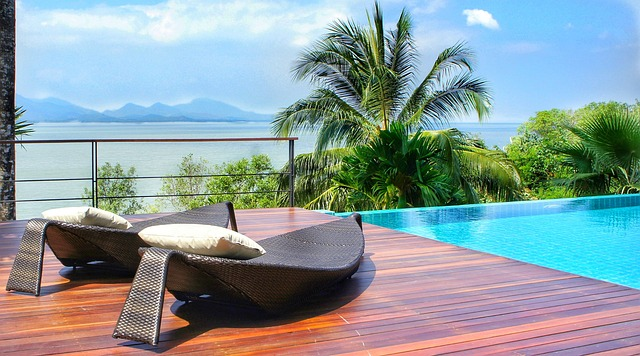
A pool deck is not just a platform surrounding your pool; it’s an essential component that unifies pool elements and landscaping to create your backyard haven. Choosing the right pool deck material is crucial for the longevity and stability of your swimming pool, as well as the aesthetics of your outdoor space. From elegant wood decking to durable and slip-resistant concrete, there are a multitude of pool decking options available for swimming pools today, each with its unique advantages and drawbacks.
To make an informed decision, it’s important to consider factors such as the composition of the soil, backyard features, and local climate. Consulting a certified pool builder with a working knowledge of the local terrain and soil composition is a vital step in ensuring the stability of your swimming pool and decking.
Types of Pool Deck Materials
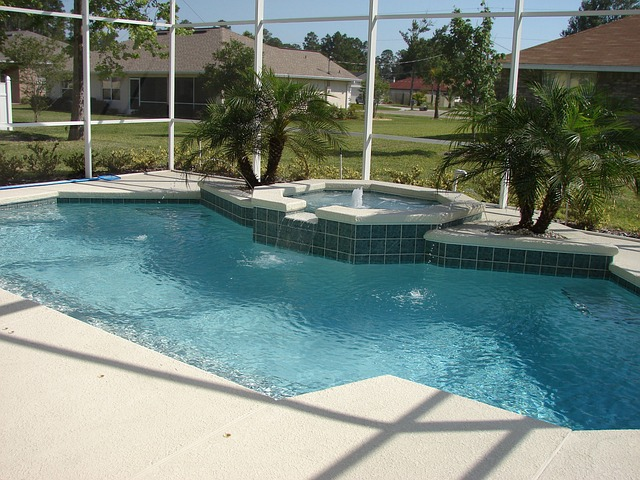
In our quest to find the perfect pool decking material, we’ll explore six popular options: concrete, wood, composite, pavers, tile, and brick. Each of these materials has unique properties that can enhance the beauty and functionality of your pool area.
Let’s dive deeper into each of these options and discover their pros and cons.
Concrete Pool Decks
Concrete is an incredibly versatile option for pool decks, offering a range of customization possibilities with color and texture. With decorative techniques such as chemical stains, integral color, dry-shake hardeners, brushed concrete, stamped concrete, and stenciled concrete, the design options are virtually limitless.
Moreover, concrete pool decks are a cost-effective alternative to other materials and require only occasional cleaning and sealing to maintain their appearance. Light-colored concrete pool decks are especially popular, as they reflect UV rays and help keep the surface cooler on hot summer days.
Wood Pool Decking
Wood is an affordable and widely-used option for above-ground pool decking. Its natural warmth and beauty can easily transform a simple pool area into an inviting oasis. However, wood decking requires regular maintenance, such as staining and sealing, to protect it from water and insect damage.
Despite its popularity for above-ground pools, wood decking is not often used for in-ground pools due to its susceptibility to harsh pool chemicals and moisture. As an alternative, concrete can be stamped and colored to mimic the look of wood planking, offering a cost-effective solution that combines the beauty of wood with the durability of concrete.
Composite Pool Decking
Composite decking, made from a combination of wood fibers and plastics, is an excellent option for above-ground pools. This material requires very little maintenance and is available in a wide range of colors and textures, making it an attractive choice for many homeowners.
However, there are some drawbacks to composite decking. It can be more expensive initially than natural wood, and it may become uncomfortablely hot underfoot in direct sunlight. To address this issue, consider using a heat-reflective material or installing an undercarriage system to support the composite decking and allow air circulation.
Paver Pool Decks
Pavers are a popular choice for pool decking due to their durability and earth tone colors, which blend seamlessly with the surrounding landscape. Pavers offer slip-resistance, effective drainage, and are amenable to DIY installation, making them a practical and attractive option for many homeowners.
On the downside, pavers may experience discoloration over time, and some pigmentation may be subject to erosion due to regular weather conditions. Nevertheless, paver pool decks, such as those made from precast concrete pavers, are known for their durability, slip resistance, and ability to mimic the look of natural stone or brick, making them an appealing option for pool decking.
Tile Pool Decking
Tile pool decking offers a variety of options in terms of color, size, and texture, allowing you to create a truly unique and personalized pool deck surface. Materials such as porcelain, stone, and other materials can be used to create beautiful and slip-resistant surfaces that enhance your pool area.
However, it is essential to consider the local climate when choosing tile pool decking, as some materials may not be suitable for all weather conditions. Always conduct a test of the materials to ensure they meet your specific needs and requirements, and prioritize slip resistance for a safe and enjoyable pool deck.
Brick Pool Decking
Brick pool decking can give your pool area a unique and colorful surface with customizable borders and patterns. This material adds a touch of sophistication and elegance to your pool area, creating a warm and inviting atmosphere for relaxation and enjoyment.
However, brick pool decking can be expensive due to high labor costs, as the bricks need to be secured to a reinforced concrete slab to avoid cracking over time. Despite the higher initial cost, brick pool decking is known for its durability, slip-resistance, and a deep color range that can enhance the appeal of your pool area.
Factors to Consider When Choosing Pool Decking
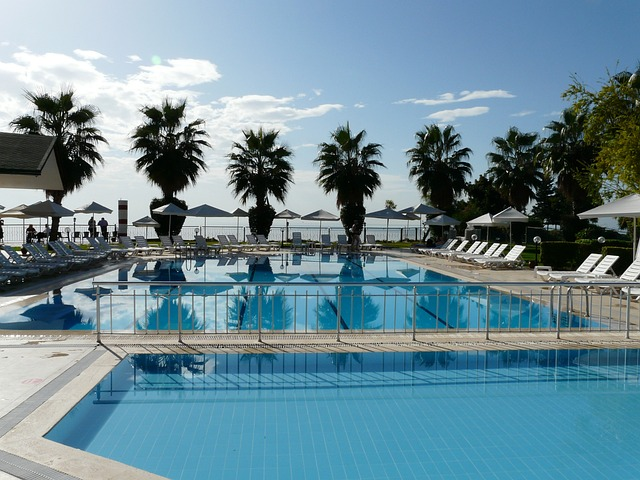
When selecting the best pool decking material for your backyard oasis, it’s important to consider factors such as cost, safety, maintenance, design, and local climate. Each material has its unique advantages and drawbacks, and it’s crucial to weigh these aspects against your specific needs and preferences. For example, if safety is a priority, consider options like pavers and concrete, which are known for their durability and slip resistance. On the other hand, if aesthetics and design flexibility are more important, materials like wood, composite, or tile may be more suitable.
It’s also essential to take into account the local climate and how it will impact your pool decking material. Some materials may be more susceptible to damage from harsh weather conditions, while others may require more maintenance in certain climates. Consulting with a professional pool builder can help you make an informed decision and ensure that your pool decking will stand the test of time, providing you with an enjoyable and safe pool environment for years to come.
Pool Decking Installation Tips
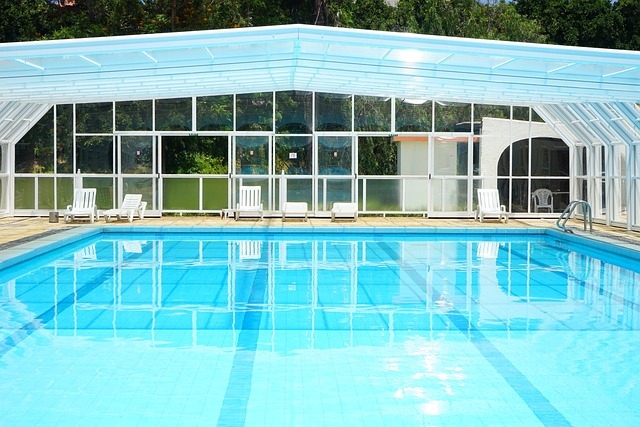
To guarantee a successful pool decking installation, it’s essential to follow some key guidelines. First, ensure that the area is properly drained and sloped to prevent water from pooling on the deck surface. Spacing between boards is also crucial, as it allows for proper air circulation and prevents moisture buildup, which can lead to warping and decay.
Additionally, it’s important to secure the proper permits from your local building authority before beginning any pool decking installation project. Working with a professional pool builder can also help ensure a smooth installation process and provide valuable guidance on the best materials and techniques for your specific pool deck project.
With proper planning and execution, you can create a stunning and functional pool deck that will enhance your outdoor living space and provide lasting enjoyment for years to come.
Common Pool Deck Designs and Ideas
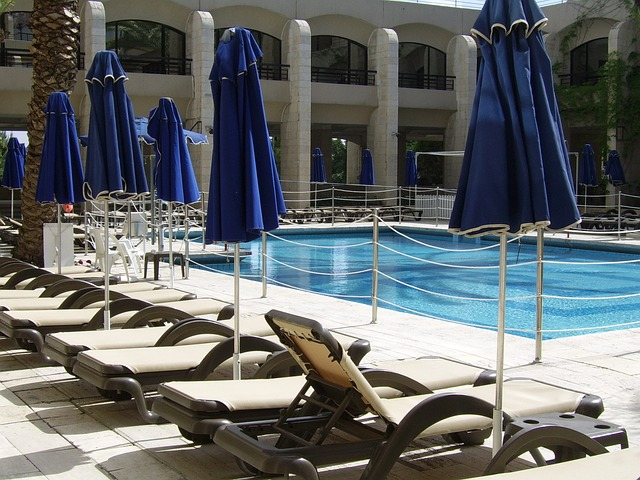
There are numerous pool deck designs and ideas available to suit your personal taste and backyard aesthetic. Some popular options include stamped concrete, wood decks, and stone patios. Stamped concrete can mimic the look of natural stone, brick, or even wood planks, offering a cost-effective and versatile solution for customizing your pool deck.
Wood decks, on the other hand, provide a warm and natural look that can be easily customized with various stains and finishes. Composite decking is another attractive option, offering the appearance of wood with the low maintenance benefits of synthetic materials.
With countless design possibilities and a wide range of materials to choose from, you can create a pool deck that is both functional and visually stunning, transforming your backyard into a true oasis.
Pool Deck Maintenance and Care
Regular pool deck maintenance and care are essential to preserve the beauty and longevity of your investment. Cleaning the surface with a mild detergent can help remove dirt, debris, and stains, ensuring your pool deck remains looking its best. Inspecting the decking for cracks, rot, and other signs of damage is also important, as prompt repairs can prevent further deterioration and prolong the life of your pool deck.
Sealing the deck every 2-5 years can help protect it from water damage, insect infestation, and UV exposure, maintaining its appearance and structural integrity. By following these simple maintenance tips, you can keep your pool deck in pristine condition and enjoy your outdoor living space for years to come.
Summary
In conclusion, choosing the right pool decking material is crucial for creating a beautiful and functional outdoor living space. From versatile concrete and warm wood to durable pavers, tile, and brick, each material offers unique benefits and drawbacks to consider. By taking into account factors such as cost, safety, maintenance, design, and local climate, you can make an informed decision and select the best pool decking option for your backyard paradise.
We hope this comprehensive guide has provided you with valuable insights and inspiration for your pool decking project. With the right material, design, and maintenance, you can create a stunning pool deck that enhances your outdoor living experience and provides lasting enjoyment for you and your loved ones. So go ahead, dive into the world of pool decking, and transform your backyard into the oasis you’ve always dreamed of.
Frequently Asked Questions
What does decking of a pool mean?
Swimming pool decking is the area surrounding a pool where people can sit, relax and sunbathe. It also serves as a safety feature, helping to prevent any accidents that might occur around the pool.
Decking provides an aesthetic look and often comes in many designs, colors and styles.
Is decking around a pool a good idea?
Yes, decking around a pool is a great idea as it provides a safe, non-slippery and aesthetically pleasing environment for poolside activities.
Furthermore, it helps keep the area tidy and free of debris that could get into the water.
How long does a pool deck last?
With proper cleaning and maintenance, a pool deck can last up to 25 years, providing many years of enjoyment for pool owners.
With the right care, your pool deck will remain strong and aesthetically pleasing for years to come.
What is the coolest surface for a pool deck?
For a pool deck that remains cool to the touch even in the height of summer, consider installing textured acrylic coatings. This modern solution is highly durable and slip resistant, yet also affordable.
The textured surface reflects light and provides a non-slip grip.
What is the best concrete option for around a pool?
For the best concrete option around a pool, stamped concrete is an excellent choice that offers good looks, durability, and low maintenance.
